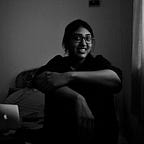6 Pressurising Notions About Reading I’ve Learned To Trash
Reading is not a race. It is about your personal relationship with stories and words.
1. Books cannot be abandoned.
A few years ago, I believed it was unforgivable to abandon a book — even if I’d completely lost interest in it. I’ve learnd now that my time is worth more than forcing myself to plough through a book that’s not worth it.
It’s okay to abandon a book. It doesn’t mean you don’t respect it or its writer. It just means you’ve made a choice to spend your time and mindspace elsewhere. Often, it’s not even the book that’s really holding us back, but our guilt. Time to let go of it.
The book I’m close to abandoning right now: ‘Uncommon Type’ by Tom Hanks
[Suggested reading: It’s Really Not A Big Deal To Abandon A Book Halfway, by Foram Dhruv]
2. All / Most classics must be read.
I tried. I really did. But even my third attempt at ‘Anna Karenina’ didn’t really work. I’ve tried all my life to read as many classics as possible, and I’ve struggled. I’ve also often described myself as someone who loves reading but hasn’t read many classics. For too long, I have pressurised myself to read them, not acknowledging that I’m perhaps just not cut out for it. Some classics are just too tedious, and right now, I am definitely looking for something simpler. Accepting that is easier than sitting through a difficult read.
Examples of what I’ve enjoyed in the past: ‘To Kill a Mockingbird’, ‘The Catcher in the Rye’, ‘Animal Farm’, ‘Brave New World’, ‘Of Mice and Men’, ‘The Little Prince’
3. A physical book is ‘better’ than an e-reader.
Let’s face it — the story will remain the same, whether it’s read via a book or an e-reader. A lot of readers (including myself) have an emotional relationship with the touch, feel and smell of a book. We also feel that books are ‘meant’ to be read in their physical form. But we can’t forget about other important aspects — ease of access, affordability and the space and privilege of carrying and maintaining books (and bookshelves). Reading on an e-reader doesn’t mean you’re not loyal to books. It just means you prioritise the act of reading over its physical form.
4. Reading can never be exhausting.
I was privileged to grow up in a house full of books. Reading was the most sought-after activity. It was always enjoyable, always reassuring.
Until it wasn’t.
Today, I like looking at books more than reading them. I am living with depression, in a constant state of anxiety and paranoia. I feel drained — by my own thoughts, by chasing an ideal version of myself. I am unable to read more than one short story at a time because my weighed-down mind can only process so much. I’ve tried everything — reading 10 pages a day, reading smaller books, reading once every two days, reading on the metro. And nothing has worked. Because forced things don’t.
So yes, reading is exhausting for me today. It’s great to embrace this feeling and focus on my recovery.
A book I liked but which was exhausting to read: ‘Midnight’s Children’ by Salman Rushdie
5. Only reading books counts as ‘real reading’.
I wish I could tell my teenage self that this notion is absolute trash and is making me a snobbish person. In my time working at Youth Ki Awaaz, I’ve come across numerous posts which have moved me just as much as a longer story may have. I’ve understood that the essence of someone’s story or opinion can be felt in various forms. Several articles online have stayed with me longer than some books have, perhaps because I found them (or they found me) when I needed them the most.
Reading is not a race. It’s about our personal relationship with stories, words and things that matter and move us.
[Suggested reading: Stop Thinking That If You Aren’t Reading Books, You Aren’t Reading At All]
6. You are a reader only if you choose literary greats over mass fiction / non-fiction.
I am guilty of being a snobbish reader, and I am not proud of it. By scoffing at a book I’d not pick up, I had completely overlooked my privilege of being able to access and afford the books I’d like. Also, regardless of the number of options available, every reader has the right to choose what they wish to and don’t wish to read.
A fellow intern at an NGO once told me, “I don’t want all this heavy literature! I am just happy that I am reading a book.” She taught me something that I really needed to learn: just because someone isn’t reading what you are, it doesn’t mean they aren’t a reader.
[Suggested reading: How Chetan Bhagat Exposed My Snobbishness As A Reader]
Thanks for reading this! Are there any pressurising notions about reading you’ve learned to trash? Do leave a comment or Tweet to me @lipi_meh.
